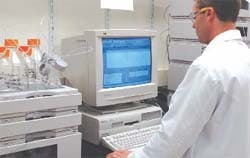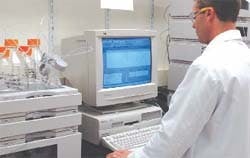Contractor Corner: Microtests Supply in Command
Microtest Labs (Agawam, Mass.) is a small- to mid-sized company specializing in contract analytical and microbiological testing and aseptic fill/finish of parenterals at the clinical and commercial scales. Its product range includes the manufacture of vaccines, small molecules, biologics, oligonucleotides and suspensions. The company recently invested $7.5 million in labs, staff and technology, doubling the size of its facilities.
One of the secrets of its success has been maintaining solid control over its raw materials supplies, whether that means working with clients to ensure the quality of incoming active pharmaceutical ingredients (“APIs”) and purified bulk drug substance (“PDS”), or with preferred suppliers to guarantee top-grade excipients.
For APIs and PDS, Microtest must defer to the client yet maintain due diligence. “Most of the time, the active ingredient is being manufactured by a separate CMO who specializes in the manufacturing of either the active biologic product, PDS, or the active small molecule, API,” says John Dobiecki, Mictrotest’s VP of Manufacturing. “So what we would do is work through the qualification process of that vendor, either to an independent qualification that we would perform, or by reviewing what our client has already done.
Based on that review and subsequent dialog with our client we would generate the raw materials specification (“RMS”) for the active. That RMS would have an agreed-upon set of incoming raw material tests that we would be performing.” Actives for commercial batches receive more scrutiny, but Microtest is still somewhat at the mercy of the client.
“We’re an ‘at the end of the day’ type of CMO,” Dobiecki says. “This is material that the client has subcontracted out to be produced on their behalf, and our responsibility is to formulate it in the proper fashion, and then aseptically perform the fill/finish.” Dobiecki admits it’s a fine line, trusting the client to have done its homework on a product but being willing to step in when firm advice is needed.
“Luckily, we have a pretty good experience base here,” he says. “But very early on, we make it real clear that the client bears any issues with the active component(s).” Excipients are a different matter. Microtest’s general strategy of vetting vendors is to qualify primary and secondary vendors. It also tends to rely upon USP- or EP-type materials from large suppliers with proven quality systems. One such vendor is VWR International (West Chester, Penn.)
“They have qualified their vendors, and we have systems in place that qualify VWR and their vendor qualification process,” he notes. “This process allows us to have confidence that regardless of where VWR sources the materials they will meet all the specification requirements for that grade, and whatever our incoming testing requirements are.”
Microtest has first-name relationships with its suppliers. Nevertheless, due diligence and oversight are always required. The company has a material review board comprised of representatives from senior management, manufacturing, QA and QC. “When we bring in a new product – a new active, excipient, or even a process-related consumable such as tubing – we look at what the vendor specifications are,” he says. “Then we determine, with client input, what the appropriate incoming testing requirements are going to be. For early clinical trial runs we’ll typically defer to identity testing, perhaps some microbiological testing and review of the Certificate of Analysis, with the caveat being that the vendor must either be a qualified vendor or, in the case of active, client qualified.”
“All the specifications that are associated with a particular raw material or active ingredient are reviewed internally,” he continues, “and if there are any questions as far as the appropriateness of the specification, they get raised to the client, and we mutually determine the path forward.” Like many CMOs, Microtest is upgrading its IT infrastructure to extend its control over supply. Its material management at present is primarily paperbased, but will go paperless in the next six months as a material supply management system is implemented.
The system is being customized in-house, Dobiecki says. “Our business is both in contract manufacturing and contract testing. So there’s a need to marry the receipt of test samples and the receipt of GMP materials in a consistent manner. This customization approach makes most sense for us right now because we have the expertise in-house to do it ourselves.” When complete, the system automatically will track incoming raw materials, maintain and replenish inventories, and identify material locations.

